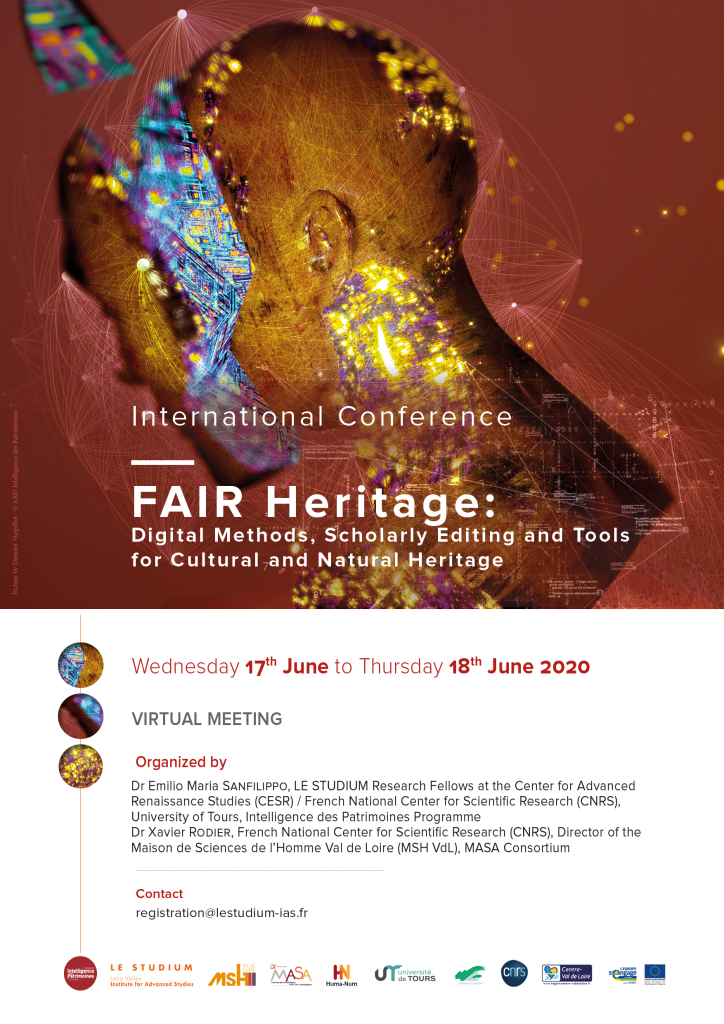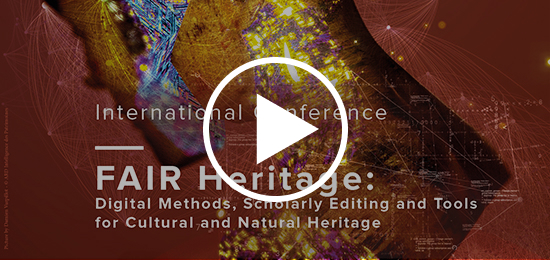INTERNATIONAL CONFERENCE
FAIR Heritage: Digital Methods, Scholarly Editing and Tools for Cultural and Natural Heritage
Virtual Meeting
17th-18th June 2020
Documents :
FAIR Heritage Booklet of abstracts
FAIR Heritage Comments

This international conference is organised in the framework of the ARD Intelligence des Patrimoines Programme and the MASA Consortium, in partnership with Le Studium Loire Valley Institute for Advanced Studies.
A plethora of data about cultural and/or natural heritage is nowadays available to both public and private institutions (e.g., universities, libraries, archives, museums, etc.). These data are highly heterogeneous in terms of both formats and contents. In addition, the way in which they are organized and characterized depends on the socio-cultural contexts of different working communities, their research methodologies, languages, and ways of thinking. As a consequence of this heterogeneity, it is hard to find connections across multiple datasets or to agree on data publishing policies and shared vocabularies to describe data in a common manner.
Researchers and stakeholders challenge this situation by relying on theories, methodologies, and technologies developed in areas such as Linguistics, Conceptual modeling, Data Science, Artificial Intelligence, Knowledge representation and reasoning. These research efforts are characterized by a strong interdisciplinary nature and their methods are nowadays largely exploited in Social Sciences and Humanities (including Digital Humanities).
The purpose of the conference is to bring together multiple research communities and stakeholders working with Open Science and FAIR principles in the context of heritage studies. As advocated by the European Commission, FAIR principles play a decisive role to define guidelines and valuable tools for managing data in robust ways. We are particularly interested in research questions addressing both methodological and application challenges emerging from data management practices (e.g., data modeling, sharing, integration, analysis, etc.). The conference will provide guidance and ensure the sustainability and implementation of the FAIR model in the context of the European Open Science Cloud. For this purpose to be achieved, the conference will host practical sessions where participants can familiarize with existing methods and tools, and can present their own applications.
CONVENORS
• Dr Emilio Maria Sanfilippo, LE STUDIUM Research Fellow / ARD Intelligence des Patrimoines Programme in residence at the Center for Advanced Renaissance Studies (CESR)/CNRS, University of Tours – FR
• Dr Xavier Rodier, French National Center for Scientific Research (CNRS), and Director of the Maison de Sciences de l’Homme Val de Loire (MSH VdL)
SPEAKERS
- Prof. Roland Billen, Geomatics Unit, University of Liège – BL
- Dr George Bruseker, Takin.solutions – BG
- Dr Cécile Callou, National Museum of Natural History (MNHN) / CNRS, Sorbonne University – FR
- Dr Cesar Gonzalez-Perez, Institute of Heritage Sciences, Spanish National Research Council (CSIC) – ES
- Dr Florent Laroche, École Centrale of Nantes – FR
- Dr Livio De Luca, Models and Simulations for Architecture and Heritage / CNRS – FR
- Dr Carlo Meghini, Istituto di Scienza e Tecnologie dell’Informazione “A. Faedo”, National Council of Research (CNR) – IT
- Dr Alessandro Mosca, Faculty of Computer Science, Free University of Bozen-Bolzano – IT
- Prof. Elena Pierazzo, Centre for Advanced Studies in the Renaissance (CESR) / University of Tours – FR
- Dr Ana Roxin, University of Burgundy – FR
- Prof. Julian D. Richards, Department of Archaeology, University of York – UK
- Dr Marianna Simoes, Senckenberg Deutsches Entomologisches Institut – DE
- Dr Sara Tonelli, Bruno Kessler Foundation (FBK), Trento – IT
- Prof. Douglas Tudhope, University of South Wales – UK
SCIENTIFIC COMMITTEE
- Emmanuelle Bryas, French National Institute for Preventive Aecheological Research (Inrap) – FR
- Pierre-Yves Buard, House of Research in Social Sciences and Humanities of Caen (MRSH), University of Caen – FR
- Johann Forte, Centre for Advanced Studies in the Renaissance (CESR) / CNRS, University of Tours – FR
- Roberta Ferrario, Laboratory for Applied Ontology (LOA), ISTC-CNR – IT
- Ludger Jansen, Institute of Philosophy, Rostock University – DE
- Corinne Jouys-Barbelin, National Archaeology Museum of Saint-Germain-en-Laye – FR
- Adeline Joffres, TGIR Huma-Num / CNRS, University Aix-Marseille – FR
- Marion Lamé, LE STUDIUM Research Fellow, ARD Intelligence des Patrimoines, Centre for Advanced Studies in the Renaissance (CESR) / CNRS, University of Tours – FR
- Béatrice MARKHOFF,Laboratory of Fundamental and Applied Computer Science of Tours (LIFAT), University of Tours – FR
- Alessandro Mosca, Faculty of Computer Science, Free University of Bozen-Bolzano – IT
- Olivier Marlet, CITERES / CNRS, MSH, University of Tours – FR
- Aurélien Montagu, Le Studium Loire Valley Institute for Advanced Studies – Orléans & Tours – FR
- Marianna Nicolosi Asmundo, Department of Mathematics and Computer Science, University of Catania – IT
- Blandine Nouvel, Mediterranean House of Human Sciences & GdS Frantiq / CNRS, University Aix-Marseille – FR
- Elena Pierazzo, Centre for Advanced Studies in the Renaissance (CESR) / CNRS, University of Tours – FR
- Nathalie Le Tellier-Becquart, House of Social Sciences (MSH) Mondes / CNRS, University Paris Nanterre & Paris 1 Panthéon-Sorbonne – FR
- Perrine Thuringer, ARD Intelligence des Patrimoines, Centre for Advanced Studies in the Renaissance (CESR) / CNRS, University of Tours – FR
- Miled Rousset, House of the Orient and the Mediterranean (MOM) / CNRS, University Lumière Lyon 2 – FR
- Damien Vurpillot, ARD Intelligence des Patrimoines, Centre for Advanced Studies in the Renaissance (CESR) / CNRS, University of Tours – FR
PROGRAMME, PRESENTATIONS AND VIDEOS
WEDNESDAY JUNE 17th 2020
- 09:00 Technical introduction & institutional presentation
Prof. Benoist Pierre, Sophie Gabillet, Dr Xavier Rodier, Dr Emilio M. Sanfilippo & Dr Damien Vurpillot - 09:30 Official Opening
Dr Xavier Rodier & Dr Emilio M. Sanfilippo
SESSION 1: Ontologies and Semantic Web technologies for cultural heritage
- 10:30 Dr George Bruseker – Realizing the Virtues (and Combating the Vices) of the Digital Shift in Heritage Scholarship: the Role of Knowledge Representation
- 11:15 Coffee break
- 11:30 Dr Alessandro Mosca – Ontology-based data integration in EPNet
- 12:00 Dr Cesar Gonzalez-Perez – Ontologies of Cultural Heritage for Humans and Machines: The Cultural Heritage Abstract Reference Model
- 12:30 Lunch break
SESSION 2: Data Management for Natural heritage
-
14:00 Dr Marianna Simoes – Primary data and Entomological collections: utility, best practices and challenges
-
15:15 Break
SESSION 3: Digital Scholarly Editing: Theories, methodologies, and tools
- 15:30 Prof. Elena Pierazzo – The edition of draft manuscripts: theories, (data) models and methods
- 16:00 Dr Carlo Meghini – Extending Digital Libraries with Digital Narratives
FLASH TALKS
- 16:30 Denise Ardesi & Christian Steiner – Semantic coordination on Medieval cooking recipes
- 16:40 Mériç Akdogan, Pauline Bellemere & Inoussa Kora Chabi – DiVE Project
- 16:50 Djibril Diarra – Hybrid Artificial Intelligence for Medieval Illuminations Analysis
- 17:00 Dr Wieslawa Duzy – Project “Historical Ontology of Urban Space” (HOUSe) – introduction
- 17:10 Florian Hivert – ROSER – Répertoire de l’Ornement Sculpté des Édifices de la Renaissance: An interoperable scholarly digital edition for the ornamentation in Renaissance edifice
- 17:20 Blandine Nouvel – Deconstructing for reconstructing: the use of the BBT for reorganising the PACTOLS thesaurus
- 17:30 Prof. Ludger Jansen – Why DH ontologies need standards too
- 17:40 Dr Tomasz Panecki – Digital editions of historical maps: between images and data. The example of “Gaul/Raczyński” topographic map (1807-1812)
- 17:50 Caroline Parfait & Marlène Arruga – Development of digital platform about stained glass restoration data in France
- 18:00 Dr Stéphanie Satre – Epicherchell, an epigraphic dataset to share and publish
- 18:20 Prof. Danielle Ziébelin – Patrimalp, an integrated and interdisciplinary cultural heritage platform for the French Alps
- 18:30 Final discussions
THURSDAY 18th JUNE 2020
- 09:00 Damien Vurpillot et Perrine Thuringer – ARD Programme Intelligence des Patrimoines: Heritage(s) digital ecosystem
- 09:30 Miled Rousset – OpenTheso and PACTOLS
- 10:00 Coffee break
- 10:15 Emmanuelle Bryas, Nathalie Le Tellier-Becquart, Emmanuelle Morlock – A Data Management Plan Template for Archaeology
- 10:45 Olivier Marlet – OpenArcheo
SESSION 4: Data mining and NLP for cultural heritage
- 11:30 Dr Sara Tonelli – What NLP can do for Metadata Quality: The Case of Descriptions in Cultural Heritage Records
- 12:30 Lunch
SESSION 5: Information systems for 3D data and semantic annotations
- 14:00 Prof. Roland Billen – The Coudenberg Heritage Building Information System
- 14:45 Dr Florent Laroche – French National Project ReSeed – Semantic reverse-engineering of digital heritage objects
- 15:15 Dr Ana Roxin – Semantic-based BIM Modelling : Approaches and related Standardization Actions
- 15:45 Break
SESSION 6: Digital data services for cultural heritage
- 16:15 Dr Livio De Luca – A digital ecosystem to document, in space and time, the restoration of Notre-Dame de Paris
- 17:00 Prof. Julian D. Richards – Making Archaeology FAIR: in the Archaeology Data Service and ARIADNE
- 17:30 Prof. Douglas Tudhope – Reflections on the semantic integration of archaeological datasets and grey literature reports

Cette opération est cofinancée par l’Union européenne. L’Europe s’engage en Région Centre-Val de Loire avec le Fonds Européen de Développement Régional.
